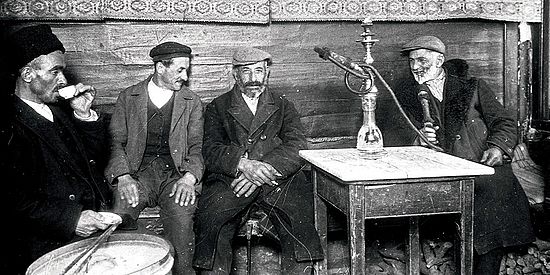
Near and Middle Eastern Studies (Master's Degree Subject)On the Way to Well-founded Middle East Expertise
The Master’s Degree Program in Near & Middle Eastern Studies at the University of Basel deals with historical, cultural, social and political topics concerning the eastern Mediterranean area «from Sarajevo to Cairo», which is strongly influenced by Islam. Accordingly, a key feature of the master's program is the inclusion of Southeast Europe, the present-day Republic of Turkey, and the Eastern Arab world (including Egypt). Compared with similar programs of study in Switzerland and at German-speaking universities in general, the focus in Basel is therefore on «Near Eastern Studies». Study focuses on developments from the early modern period, starting around 1500, to the present day. The philology of modern Arabic and/or Turkish serves as the starting point for a historical and sociological approach to Islamic culture and religion.
Focal areas of teaching and research
In Basel, the historical geographical term «Near East» was deliberately chosen as a descriptive complement to the regional research field of «Middle Eastern Studies» in order to reestablish teaching and research on the connections between Southeast Europe, Turkey and the eastern Arab world in the eastern Mediterranean that broke down at the end of World War I.
The focus is on the political and intellectual history of the Middle East in the 19th and 20thcenturies. The master’s program deals with the primary political and ideological currents of this period, such as nationalism, Islamism and confessionalism, as well as the rise of modern nation-states in the Middle East and Southeast Europe. The program also includes modern cultural and social studies of the region, as well as current politics and international relations in the Middle East.
Study is based on methods, models and theories from the social sciences, which are combined with the working methods of humanities disciplines such as history, philosophy and literature.
The department is involved in numerous collaborations at the University of Basel, such as the «Cultural Topographies». It has close ties with the departments of Eastern European Studies, Religious Studies and Political Science.
Short profile
| Degree | MA in Near & Middle Eastern Studies |
| Type | Degree subject |
| Start date | February, September |
| Credit points | 120 |
| Study structure | The Master's degree is the second degree after the Bachelor's degree and comprises a total of 120 credit points (CP). In addition to Near & Middle Eastern Studies, students choose a second, independent subject, whereby both subjects are studied for 35 CP each. The subject in which the master's thesis (30 CP) is written becomes a major, the other a minor. In addition, there are free electives (20 CP). One ECTS credit point corresponds to approximately 30 hours of work. |
| Subject combination | Near & Middle Eastern Studies allows for many beneficial combinations with other subjects in terms of content, methodology, and future career opportunities in the Near and Middle East. Students may choose a subject from the Faculty of Humanities and Social Sciences or an extra-faculty subject as their second Master's degree subject. Students can choose it their second subject according to their interests and appointmentscareer perspectives. The 20 CP for the free electives can be gained in courses of your choice (please check entry requirements of the respective courses). The free electives pass freely selectable coursesThey that can be used to deepen knowledge in the degree subjects, to gain insights into other degree subjects offered by the University of Basel or to acquire language skills. |
| Language of instruction | German, English |
| Subject area | Near and Middle Eastern Studies |
Master’s admission requirements
Admission to master’s programs is regulated by the university student regulations and the stipulations of the individual degree program descriptions. More details of the general master’s admission requirements are provided here.
For students to be admitted with no additional requirements, they must hold a bachelor’s degree worth 180 CP from a higher education institution recognized by the University of Basel.
Subject-related requirements are defined in the admission requirements (section 3) of the study program for the relevant subject. The guidelines may also contain further useful information that is key to successful studies.
Registration dates
Students must register for their bachelor’s or master’s degree program within a specified timeframe – even in cases of delayed registration.
Information events
The University of Basel organizes regular information events for bachelor’s and master’s programs. Details can be found on the events page of the Faculty of Humanities and Social Sciences.
Some subject areas also offer their own separate information or welcome events. Please consult the page for the relevant subject area for event dates and locations.
Deadlines and dates for the Master's studies
See also factsheets under Documents & Factsheets.
Master's thesis
Master's examinations for students of the subject and degree program
Master's degree
All data subject to subsequent changes.
Career opportunities
The Master’s Degree Program in Near & Middle Eastern Studies differs clearly from the bachelor's degree in terms of academic level. The advanced academic instruction provided by this program qualifies students for work in science, research and teaching, or prepares them for subsequent doctoral studies or a career as a Middle East expert in political or journalistic institutions.
The extensive linguistic, historical and cultural knowledge provided by the program, often combined with experience abroad, opens up good employment opportunities in numerous non-university areas, although such opportunities often require practical training in the respective professional field. Prospects include careers in the following fields: intercultural cooperation, integration/migration, aid agencies and international organizations (International Red Cross, Caritas, etc.), diplomatic service, journalism (newspapers, media), civil service, business and banking, museums, the publishing sector, libraries, archives, documentaries, or translation/interpreting (additional training required).
Academic advice
Teaching committee
Quick Links
